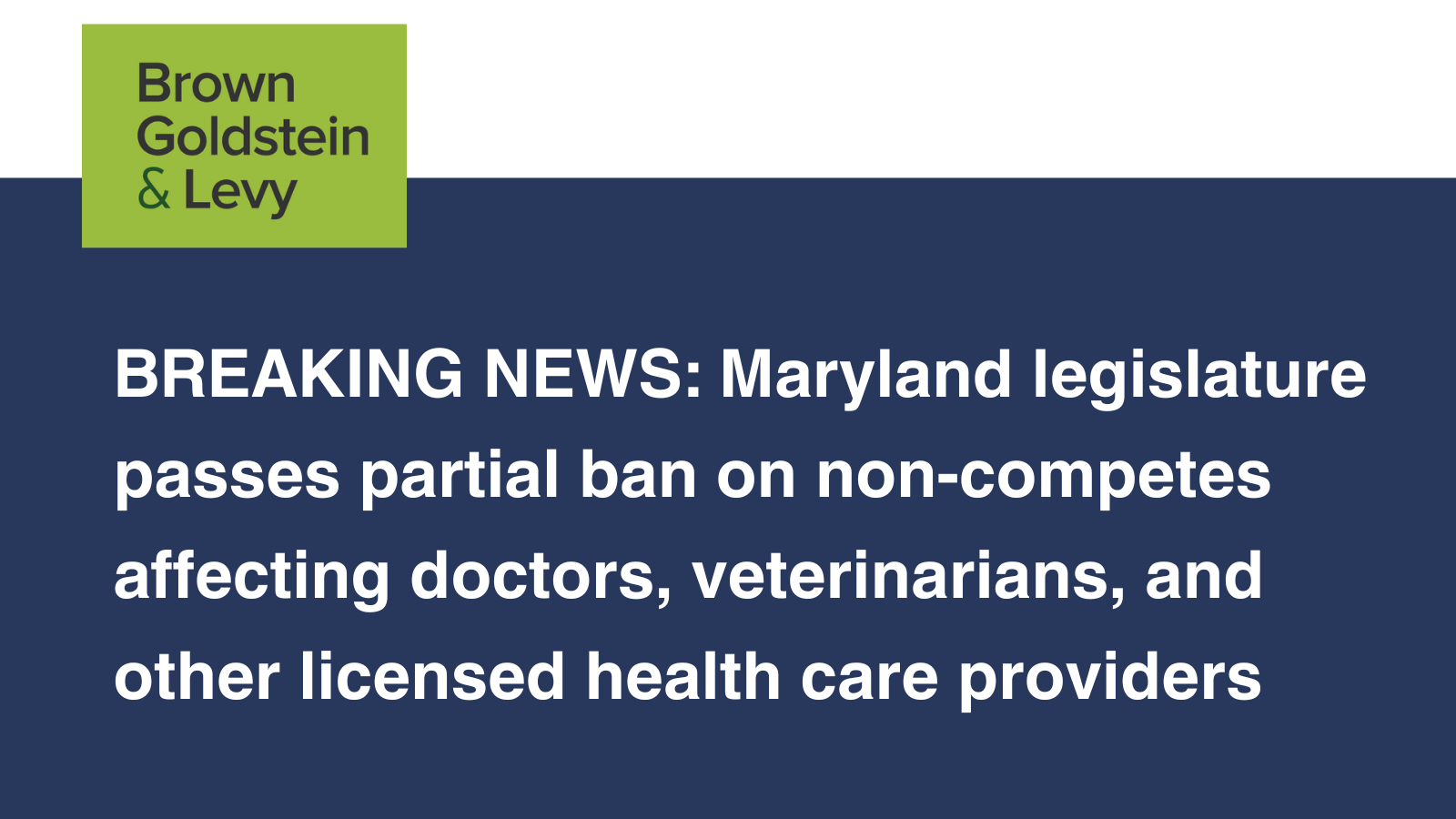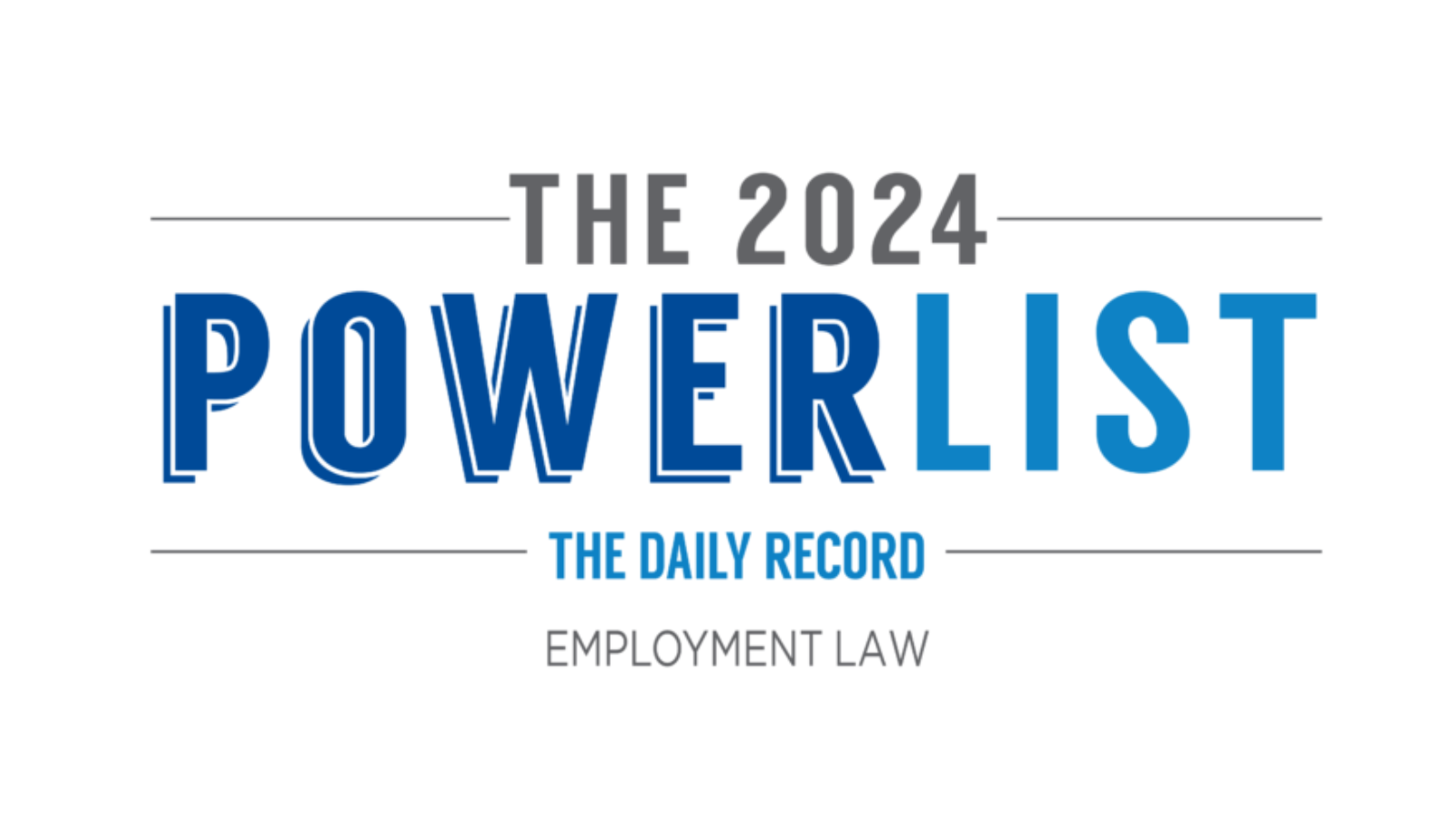Meet the Coordinators Steering Florida’s Clean Boating Movement, One Marina at a Time – Technologist
When you think about boating, you imagine perfect days on the water with friends and family—soaking up the sun, casting a line, and enjoying the moment. But to keep those good times rolling, clean boating steps into the picturesque scene. Fortunately, Florida Sea Grant’s Clean Boating Coordinators are working closely with marinas to promote pollution prevention through the voluntary Clean Marina Program (CMP), offering essential resources and guidance to help implement best management practices.
Currently, there are three coordinator positions, each covering a different region of Florida: Dave Fuller oversees the Northwest, Morgan Smith the Northeast, and Octavio Franco manages both the Southeast and Southwest (until the new SW Coordinator Kiera Fielding begins in October and takes over the Southwest region).
Coordinators are dedicated to helping marinas effectively teach boaters about clean practices. Their role includes traveling to marinas for site visits to perform assessments and/or advisory sessions, where they assist staff in understanding the Clean Marina Program and preparing for official walk-throughs of the properties. Although participation is voluntary, coordinators act as liaisons between marinas and regulatory departments within the Florida Department of Environmental Protection (FDEP), helping marinas meet regulations without the fear of penalties. Franco likens his role to “a professor who shares answers before the test.”
Under the Clean Vessel Act (CVA), funding is provided to marinas to install sewage discharge facilities, commonly known as pump-outs. Managing these pump-outs is essential for handling human waste from boats and is another key responsibility of the coordinators. They assist marinas with the application process for CVA grants, help boaters use the “Pumpout Nav” app to locate operational pump-out stations, and assist the Florida Sea Grant CVA Coordinator Vicki Gambale with regularly testing these facilities to ensure they remain functional on the Pumpout Nav.
With over 1 million boaters in Florida, plus many more visiting seasonally, keeping the state’s waters clean is a significant challenge, especially since reaching everyone is nearly impossible. Working directly with marinas helps manage this challenge by focusing on a key segment of the boating community. Marinas play a crucial role in regional boating activities, and given Florida’s diverse regions—culturally, geographically, and environmentally—coordinators must bring their unique skills and backgrounds to their roles.
Regional Clean Boating Coordinators
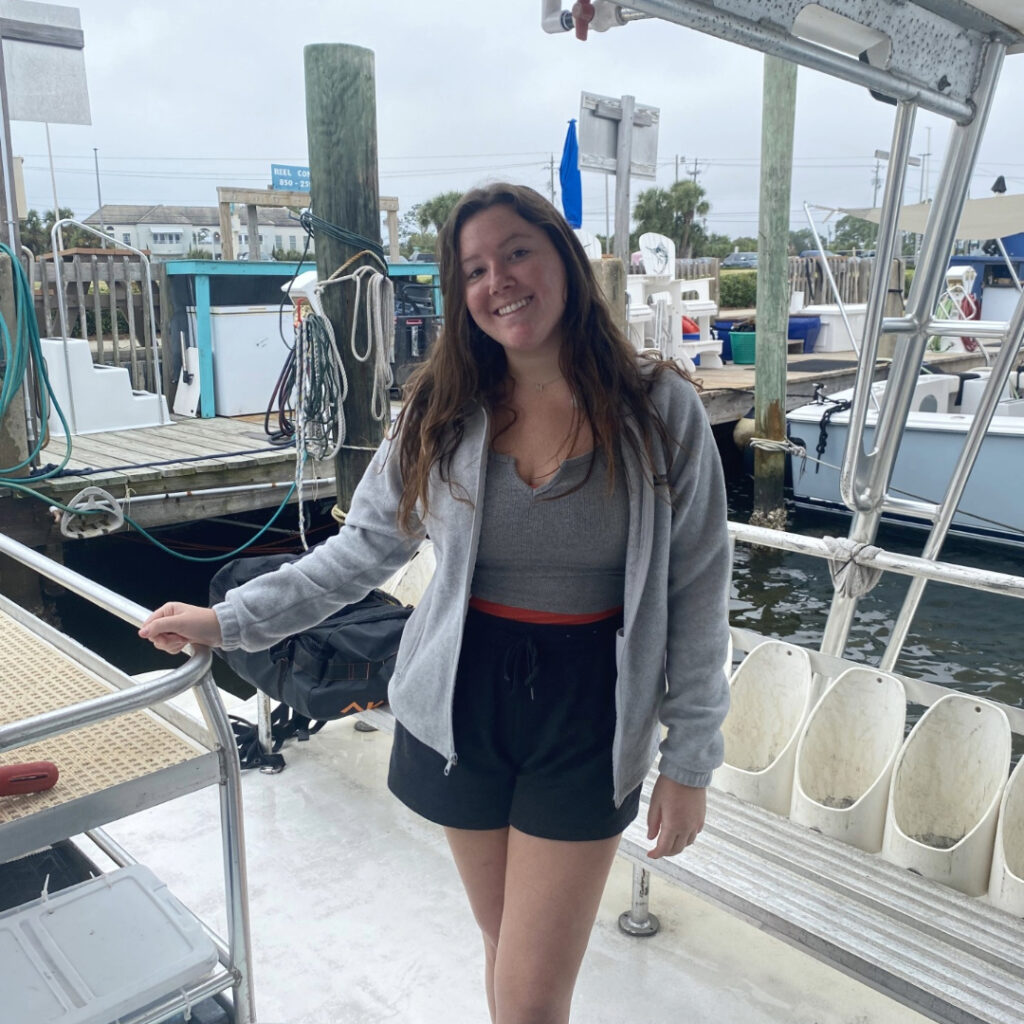
Morgan Smith at marina in St. Augustine.
Morgan Smith, a recent Florida State University graduate, is the Northeast Clean Boating Coordinator for Florida Sea Grant. In her position, Smith combines her education and outreach efforts to protect the same waters she grew up on.
Born and raised in St. Augustine, Florida, Morgan has a background in environmental science, including internships with a Wildlife Center and Florida Fish and Wildlife Conservation, where she worked on black bear research and submerged aquatic vegetation. After graduating, she worked as an environmental specialist at the Florida Department of Environmental Protection (DEP).
Growing up around boats and marinas, Morgan’s personal connection to the region makes her role particularly meaningful.
“It does feel personal to me, especially since I get to work in the Northeast, where I’m from. I think it’s really cool to build personal relationships with the marina staff I’ve visited before,” says Morgan. “It’s funny because before I knew about this role, I had visited many of these marinas, and now I get to see all the behind-the-scenes work involved in maintaining them as Clean Marinas.”
Smiths’ parents are full-time cruisers, living on their boat, and now use these pump-out systems regularly.
“Spending time with them, I’ve seen firsthand how important it is for boaters to know where these facilities are. Even experienced boaters, like my parents, didn’t realize the different rules for dumping waste in the Atlantic versus the Gulf,” says Smith. “Boater education is crucial because sometimes even seasoned boaters aren’t aware of the finer details and may not realize they’re doing something wrong.”
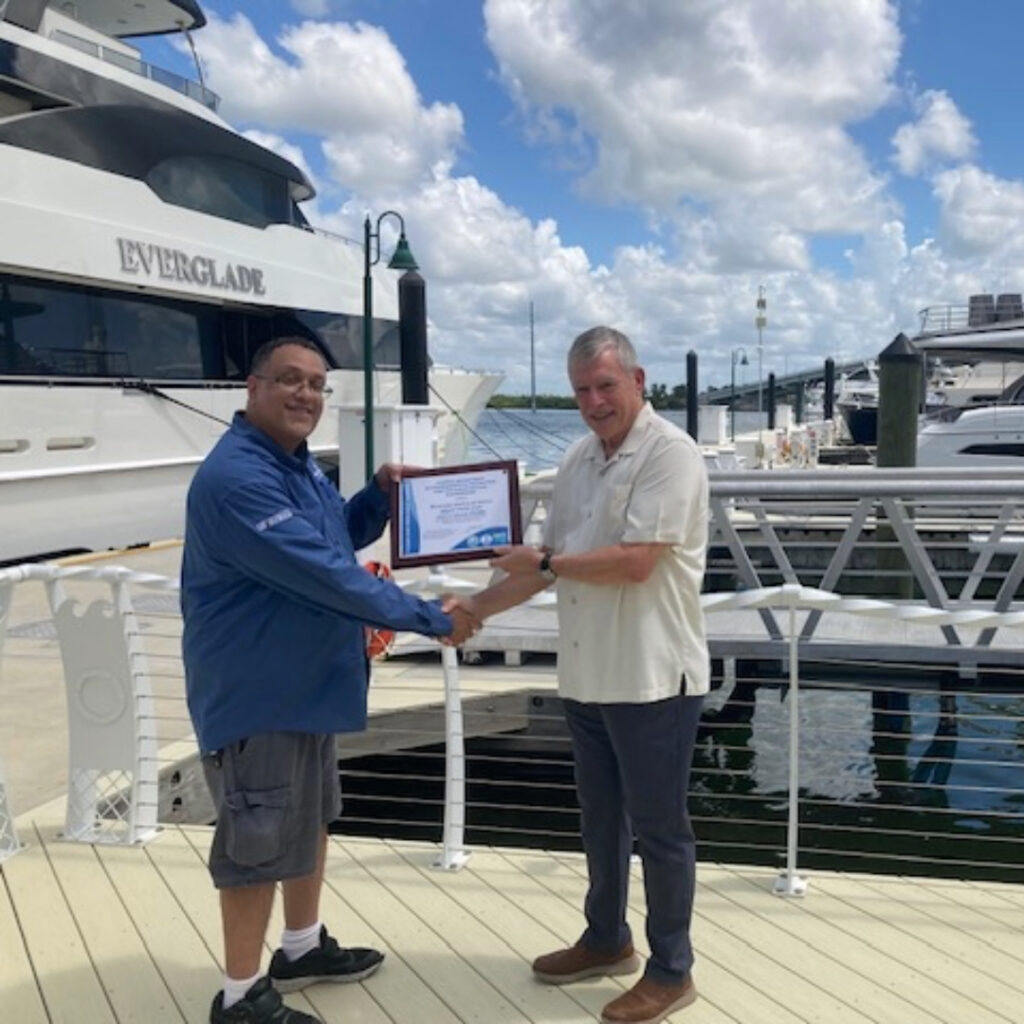
Octavio Franco presenting Clean and Resilient Designation certification to marina.
On the other end of the state, Octavio Franco is hard at work in one of Florida’s top boating hotspots, otherwise known as South Florida.
Franco earned his undergraduate degree in sustainability management and development, with a focus on marine biology and aquaculture. He served in the U.S. Navy, where he gained hands-on knowledge of maritime environments.
“Both my academic career and Navy experience have been crucial in focusing on environmental issues and transitioning into marine and environmental work,” Franco explains. “Although managing a large Navy ship is quite different from overseeing a civilian marina, the experience has been invaluable for working with diverse groups of people and addressing important regulations and protocols for everyone’s safety and the environment.”
Education and outreach, often bilingual, are crucial for engaging the community and ensuring clean waters in South Florida.
“South Florida’s unique blend of cultural diversity, tourism, and protected environments including coral reefs, seagrasses and mangroves. Our strategy involves educating marinas to help them educate boaters, ensuring our environmental message reaches as many people as possible.”
Franco also emphasizes the importance of clean water in the Florida Keys, a vital environmental area of South Florida.
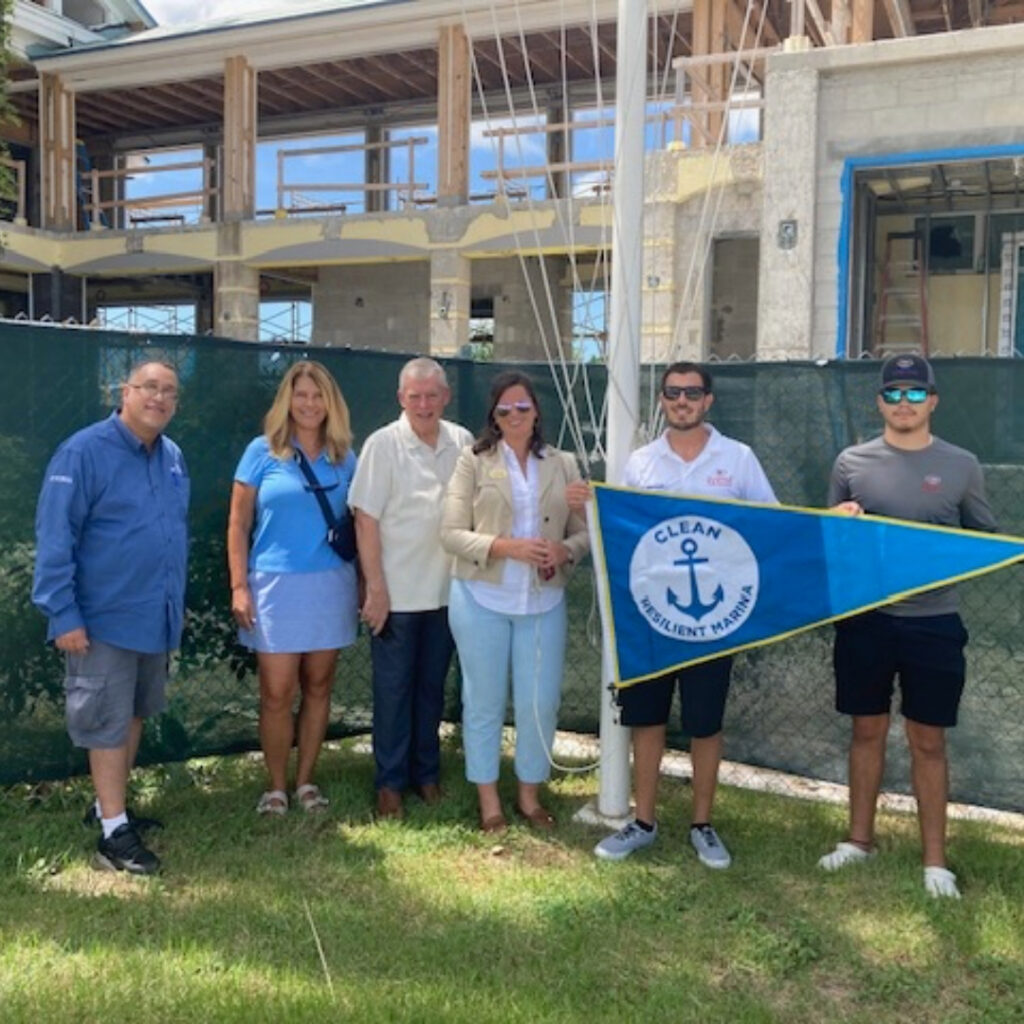
Marco Island Yacht Club with Clean and Resilient Designation Flag.
“The economic impact of clean water in the Keys is enormous—it’s their livelihood. While the entire Florida coast is known for its beaches and water, the Keys rely even more heavily on their waters for their tourist-based economy, especially sportfishing. Maintaining pristine conditions in the Keys is crucial for their hospitality and boating industries.”
Currently, Florida boasts 327 Clean Marinas and 30 Clean and Resilient Marinas. The distinction lies in their levels of environmental preparedness: Clean Marinas meet essential standards, while Clean and Resilient Marinas exceed them with comprehensive emergency plans and proactive management, setting them apart as elite within the program.
Recently, the Marco Island Yacht Club in Marco Island, Florida, along with Safe Harbor Marathon Marina and Marlin Bay Marina in Marathon, Florida, earned the Clean and Resilient Marina designation. Our coordinators are dedicated to maintaining and expanding these numbers through their ongoing efforts. Our Clean Boating coordinators are shaping Florida’s boating scene, ensuring that our fun on the water can continue for years to come.
Learn more about Florida Sea Grant’s Clean Boating Program and discover the full story behind our Northwest Clean Boating Coordinator, Dave Fuller, and the adventures that led him to this role.
